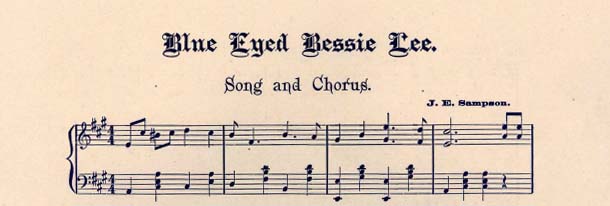
Historic Sheet Music Collection
Document Type
Score
Publication Date
1915
Lyrics
[Verse 1]
I was sad and weary hearted, and I thought I’d take a rest,
So I hopped a train and started to a place I love the best,
Back to my hometown once again,
Where I could ease my tired brain,
Instead of peace and quiet ‘’twas a riot,
I went most insane.
[Chorus]
Verse 1:
You’d never know that old hometown of mine,
At night along the main street white lights shine,
The old Y. M. C. A. is now a cabaret,
And the girls all look so sweet, so neat, and cute, and pretty too.
Around the town a horse is never seen,
For ev’ry boob has bought a Ford machine
With gasoline,
And men who’ve stayed home all their lives,
Are dancing ev’ry night with other fellow’s wives,
You’d never know that old home town of mine.
Verse 2:
You’d never know that old home town of mine,
Both Deacon Jones and Parson Brown drink wine,
Why, all the surface cars have little service bars,
And the old town clown called Gus, the cuss, has got a jitney bus.
The farmers do their chores in ev’ning clothes,
Not one keeps tabs on where his neighbor goes,
Nobody knows The wonders there will never stop,
The police department thinks that he’s a regular cop,
You’d never know that old home town of mine.
[Verse 2]
Time can bring a lot of change, that’s a thing that’s plainy seen,
All you see down home is strangers, hanging ‘round the village green;
Why, even pa’s forgotten how to milk the good old Brindle cow,
And all the boys play poker, use the joker, It’s all diff’rent now.
[Chorus]
Recommended Citation
Johnson, Howard and Donaldson, Walter, "You’d Never Know That Old Town Of Mine" (1915). Historic Sheet Music Collection. 1244.
https://digitalcommons.conncoll.edu/sheetmusic/1244
The views expressed in this paper are solely those of the author.
Comments
You’d Never Know That Old Town Of Mine
Words by Howard Johnson
Music by Walter Donaldson
New York: Leo. Feist Inc. (1915)
Some of these resources may contain offensive language or negative stereotypes. Such materials should be seen in the context of the time period and as a reflection of attitudes of the time. The items are part of the historical record, and do not represent the views of the library or the institution.